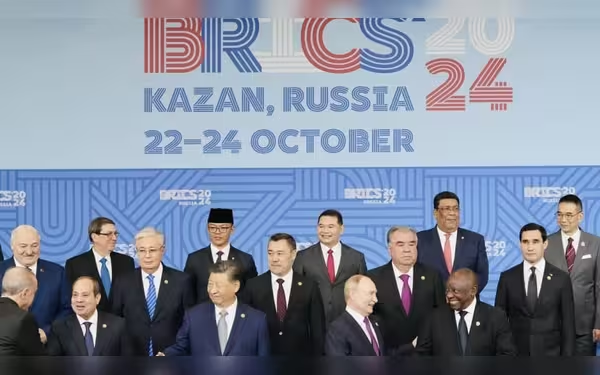Monday, November 25, 2024 05:58 AM
Southeast Asia's Interest in BRICS Membership Amid Geopolitical Shifts
- Southeast Asian nations eye BRICS membership for economic benefits.
- Trump's potential return may influence regional alliances.
- Vietnam remains cautious about joining BRICS due to geopolitical concerns.
 Image Credits: channelnewsasia
Image Credits: channelnewsasiaSoutheast Asian nations are exploring BRICS membership, influenced by geopolitical shifts and economic aspirations amid potential Trump presidency.
SINGAPORE: In a world marked by geopolitical tensions and shifting alliances, several Southeast Asian nations are expressing a growing interest in joining the BRICS grouping, which includes emerging economies like Brazil, Russia, India, China, and South Africa. This interest is particularly evident among countries such as Malaysia, Indonesia, Thailand, and Vietnam, which have recently been recognized as partner countries of BRICS. However, not all of these nations are eager to pursue full membership, reflecting a blend of national ambitions and regional dynamics.
As the political landscape evolves, the potential return of Donald Trump to the presidency of the United States could serve as a catalyst for these Southeast Asian countries to deepen their ties with BRICS. Analysts suggest that the uncertainties surrounding U.S. economic policies under a Trump administration may prompt these nations to seek alternative partnerships. According to experts, "This Trump 2.0 presidency could push Southeast Asian countries to explore closer ties with BRICS, motivated by concerns over U.S. economic policies." This sentiment highlights the strategic calculations that countries in the region are making in response to global shifts.
Last month, during a summit in Kazan, Malaysia, Indonesia, Thailand, and Vietnam were officially recognized as partner countries of BRICS, joining nine other nations. Established in 2006, BRICS initially included Brazil, Russia, India, and China, with South Africa joining in 2010. The recent expansion of BRICS to include Egypt, Ethiopia, Iran, and the United Arab Emirates (UAE) has further solidified its position as a significant player in the global economy, representing over $28.5 trillion, or about 28 percent of the world’s economy.
Among the Southeast Asian nations recognized as BRICS partners, there is a noticeable difference in their motivations for seeking full membership. Malaysia, Indonesia, and Thailand have expressed a desire to become full members, indicating their comfort with BRICS' direction and the potential economic and geopolitical benefits. In contrast, Vietnam is taking a more cautious approach, preferring to remain a partner for now. Experts note that Vietnam is wary of the potential consequences of BRICS adopting a more anti-Western stance, which could jeopardize its relations with the U.S. and the European Union, its primary export markets.
Vietnam's strategic outlook on joining multilateral organizations like BRICS is characterized by a careful deliberation process. Analysts suggest that Vietnam's hesitance may stem from BRICS' rapid expansion and the perceived lack of transparency in its membership admissions. The country follows a multi-alignment policy, aiming to maintain neutrality, and joining BRICS could complicate its foreign policy objectives.
On the other hand, Malaysia, Indonesia, and Thailand view BRICS' New Development Bank (NDB) as a vital alternative for infrastructure and development funding, crucial for their growth agendas. Joining BRICS aligns with their broader strategy of balancing geopolitical relations, allowing them to maintain autonomy amid the intensifying competition between the U.S. and China. The NDB, established in 2015, aims to mobilize resources for infrastructure and sustainable development projects in BRICS and other emerging economies.
Political motivations also play a significant role in the aspirations of Malaysia and Indonesia to join BRICS. In Indonesia, President Prabowo Subianto's ambition to be recognized as a leader of the Global South drives the country's interest in BRICS. Similarly, Malaysia's Prime Minister Anwar Ibrahim's enthusiasm for joining the bloc reflects a desire to balance relations between major powers. Both leaders aim to position their countries as influential players in the Global South and within the Association of Southeast Asian Nations (ASEAN).
In a recent interview, Prime Minister Anwar emphasized that Malaysia's decision to join BRICS is primarily guided by economic and trade interests rather than political motivations. He stated, "Malaysia is a trading nation, and we have benefitted immensely from collaborations with the U.S. and Europe. Now, with China and BRICS, we believe we are opening up avenues for increasing trade and investments." This perspective underscores the pragmatic approach that these nations are taking in navigating the complexities of global trade.
As Southeast Asian countries weigh their options regarding BRICS membership, it is clear that their decisions will be influenced by a combination of economic aspirations, geopolitical considerations, and the evolving global landscape. The potential for closer ties with BRICS presents both opportunities and challenges, and how these nations choose to engage with the bloc will shape their future in an increasingly interconnected world.













